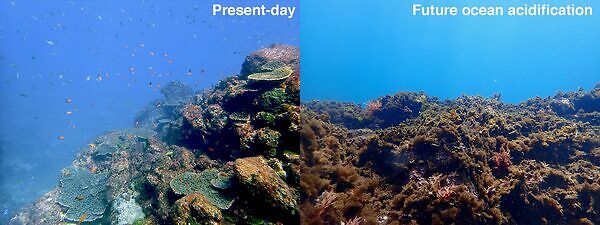[Seminar] Rise of the turfs: the simplification of marine ecosystems under ocean acidification by Dr. Ben Harvey, Tsukuba University

Date
Location
Description
Abstract:
Human activities are rapidly changing the structure of coastal marine ecosystems, but the ecological consequences of these changes remain uncertain. Natural analogues of futuristic conditions are increasingly being used to assess the likely effects of rising atmospheric CO2 emissions on marine ecosystems. Here, using a CO2 seep in Japan, we show how ocean acidification causes habitat and biodiversity loss, resulting in the simplification of marine ecosystems. This simplification involves structurally complex habitat-forming species (including corals and larger macrophytes) being replaced by more homogenous and simple turf algal habitats. Such ecological shifts are concerning because they result in habitats that have less ecological and human value. Moreover, once these ecological shifts occur, ocean acidification-driven stabilising feedback loops ‘lock-in’ these novel turf systems making them particularly difficult to reverse. By understanding the ecological processes responsible for driving community shifts, we can better assess how future communities and ecosystems are likely to be altered by ocean acidification. Taken together, we demonstrate how the simplification of marine habitats by increased CO2 levels will cascade through the ecosystem and will have severe consequences for the provision of goods and services.
Biography:
Ben Harvey is a tenure-track Assistant Professor at the Shimoda Marine Research Center, University of Tsukuba in Japan. After receiving his doctoral degree in marine climate change ecology from Aberystwyth University in the UK, he worked for 1-year as a post-doctoral researcher and lecturer of marine community ecology and genetics. In 2016, he took his position as an Assistant Professor at the Shimoda Marine Research Center in Japan where he seeks to understand how ongoing and future environmental changes will impact our oceans. Specifically, his research group focus on using multidisciplinary approaches combining field surveys, manipulative experiments, molecular and physiological techniques, and modelling, to understand how changes in environmental conditions (focussing on ocean acidification, warming, and marine heatwaves) will alter the biodiversity, community structure and functioning of future marine ecosystems.
Zoom link:
https://oist.zoom.us/j/92412500081?pwd=TnJRam1RcXV0NFBXY0tUdFA2UzA0QT09&from=addon
Subscribe to the OIST Calendar: Right-click to download, then open in your calendar application.



